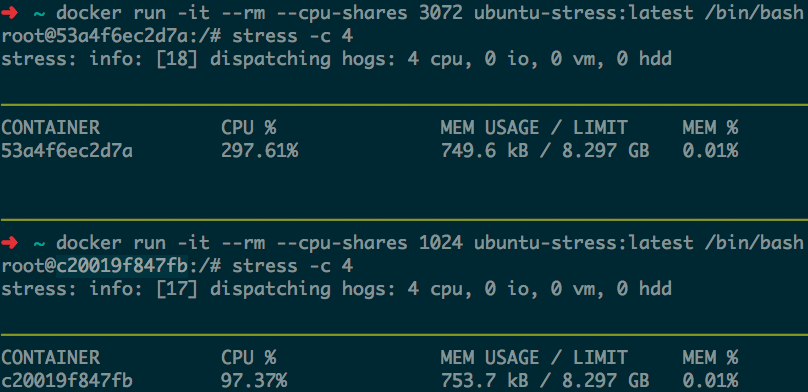Docker 资源限制之 CPU
一、压测工具同上文 Docker 资源限制之内存 使用 stress 测试。二、CPU 测试Runtime constraints on resources目前 Docker 支持 CPU 资源限制选项-c, --cpu-shares=0CPU shares (relative weight)-c 选项将会废弃,推荐使用 --cpu-shares
一、压测工具
同上文 Docker 资源限制之内存 使用 stress 测试。
二、CPU 测试
-
目前 Docker 支持 CPU 资源限制选项
-c,--cpu-shares=0- CPU shares (relative weight)
- -c 选项将会废弃,推荐使用
--cpu-shares
--cpu-period=0- Limit the CPU CFS (Completely Fair Scheduler) period
--cpuset-cpus=""- CPUs in which to allow execution (0-3, 0,1)
--cpuset-mems=""- Memory nodes (MEMs) in which to allow execution (0-3, 0,1). Only effective on NUMA systems.
--cpu-quota=0- Limit the CPU CFS (Completely Fair Scheduler) quota
➜ ~ docker help run | grep cpu
--cpu-shares CPU shares (relative weight)
--cpu-period Limit CPU CFS (Completely Fair Scheduler) period
--cpu-quota Limit CPU CFS (Completely Fair Scheduler) quota
--cpuset-cpus CPUs in which to allow execution (0-3, 0,1)
--cpuset-mems MEMs in which to allow execution (0-3, 0,1)
2.1 CPU share constraint: -c or --cpu-shares
默认所有的容器对于 CPU 的利用占比都是一样的,-c 或者 --cpu-shares 可以设置 CPU 利用率权重,默认为 1024,可以设置权重为 2 或者更高(单个 CPU 为 1024,两个为 2048,以此类推)。如果设置选项为 0,则系统会忽略该选项并且使用默认值 1024。通过以上设置,只会在 CPU 密集(繁忙)型运行进程时体现出来。当一个 container 空闲时,其它容器都是可以占用 CPU 的。cpu-shares 值为一个相对值,实际 CPU 利用率则取决于系统上运行容器的数量。
假如一个 1core 的主机运行 3 个 container,其中一个 cpu-shares 设置为 1024,而其它 cpu-shares 被设置成 512。当 3 个容器中的进程尝试使用 100% CPU 的时候「尝试使用 100% CPU 很重要,此时才可以体现设置值」,则设置 1024 的容器会占用 50% 的 CPU 时间。如果又添加一个 cpu-shares 为 1024 的 container,那么两个设置为 1024 的容器 CPU 利用占比为 33%,而另外两个则为 16.5%。简单的算法就是,所有设置的值相加,每个容器的占比就是 CPU 的利用率,如果只有一个容器,那么此时它无论设置 512 或者 1024,CPU 利用率都将是 100%。当然,如果主机是 3core,运行 3 个容器,两个 cpu-shares 设置为 512,一个设置为 1024,则此时每个 container 都能占用其中一个 CPU 为 100%。
测试主机「4core」当只有 1 个 container 时,可以使用任意的 CPU:
➜ ~ docker run -it --rm --cpu-shares 512 ubuntu-stress:latest /bin/bash
root@4eb961147ba6:/# stress -c 4
stress: info: [17] dispatching hogs: 4 cpu, 0 io, 0 vm, 0 hdd
➜ ~ docker stats 4eb961147ba6
CONTAINER CPU % MEM USAGE / LIMIT MEM % NET I/O BLOCK I/O
4eb961147ba6 398.05% 741.4 kB / 8.297 GB 0.01% 4.88 kB / 648 B 0 B / 0 B
测试两个 container,一个设置为 3072,一个设置 1024,CPU 占用如下:

2.2 CPU period constraint: --cpu-period & --cpu-quota
默认的 CPU CFS「Completely Fair Scheduler」period 是 100ms。我们可以通过 --cpu-period 值限制容器的 CPU 使用。一般 --cpu-period 配合 --cpu-quota 一起使用。
设置 cpu-period 为 100ms,cpu-quota 为 200ms,表示最多可以使用 2 个 cpu,如下测试:
➜ ~ docker run -it --rm --cpu-period=100000 --cpu-quota=200000 ubuntu-stress:latest /bin/bash
root@6b89f2bda5cd:/# stress -c 4 # stress 测试使用 4 个 cpu
stress: info: [17] dispatching hogs: 4 cpu, 0 io, 0 vm, 0 hdd
➜ ~ docker stats 6b89f2bda5cd # stats 显示当前容器 CPU 使用率不超过 200%
CONTAINER CPU % MEM USAGE / LIMIT MEM % NET I/O BLOCK I/O
6b89f2bda5cd 200.68% 745.5 kB / 8.297 GB 0.01% 4.771 kB / 648 B 0 B / 0 B
通过以上测试可以得知,--cpu-period 结合 --cpu-quota 配置是固定的,无论 CPU 是闲还是繁忙,如上配置,容器最多只能使用 2 个 CPU 到 100%。
2.3 Cpuset constraint: --cpuset-cpus、--cpuset-mems
--cpuset-cpus
通过 --cpuset-cpus 可以绑定指定容器使用指定 CPU:
设置测试容器只能使用 cpu1 和 cpu3,即最多使用 2 个 固定的 CPU 上:
➜ ~ docker run -it --rm --cpuset-cpus="1,3" ubuntu-stress:latest /bin/bash
root@9f1fc0e11b6f:/# stress -c 4
stress: info: [17] dispatching hogs: 4 cpu, 0 io, 0 vm, 0 hdd
➜ ~ docker stats 9f1fc0e11b6f
CONTAINER CPU % MEM USAGE / LIMIT MEM % NET I/O BLOCK I/O
9f1fc0e11b6f 199.16% 856.1 kB / 8.297 GB 0.01% 4.664 kB / 648 B 0 B / 0 B
➜ ~ top # 宿主机 CPU 使用情况
top - 12:43:55 up 3:18, 3 users, load average: 3.20, 2.54, 1.82
Tasks: 211 total, 3 running, 207 sleeping, 1 stopped, 0 zombie
%Cpu0 : 0.7 us, 0.3 sy, 0.0 ni, 99.0 id, 0.0 wa, 0.0 hi, 0.0 si, 0.0 st
%Cpu1 :100.0 us, 0.0 sy, 0.0 ni, 0.0 id, 0.0 wa, 0.0 hi, 0.0 si, 0.0 st
%Cpu2 : 0.7 us, 0.3 sy, 0.0 ni, 99.0 id, 0.0 wa, 0.0 hi, 0.0 si, 0.0 st
%Cpu3 :100.0 us, 0.0 sy, 0.0 ni, 0.0 id, 0.0 wa, 0.0 hi, 0.0 si, 0.0 st
... ...
以下表示容器可以利用 CPU1、CPU2 和 CPU3:
➜ ~ docker run -it --rm --cpuset-cpus="1-3" ubuntu-stress:latest /bin/bash
--cpuset-mems
--cpuset-mems 只应用于 NUMA 架构的 CPU 生效,关于这个选项这里不过多介绍。关于 NUMA 架构可以参考这篇文章 NUMA架构的CPU – 你真的用好了么?。
三、源码解析
- github.com/opencontainers/runc/libcontainer/cgroups/fs
- cpu.go
- cpuset.go
- cpuacct.go
libcontainer 只是根据设定值写 cgroup 文件,这部分没有什么逻辑性的解释。
更多推荐
 已为社区贡献6条内容
已为社区贡献6条内容







所有评论(0)